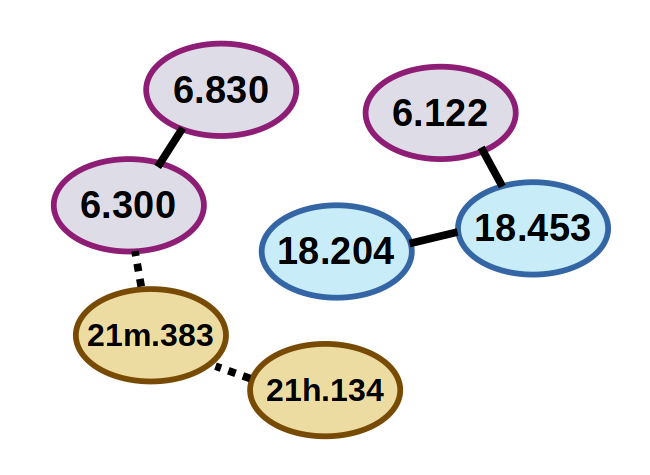As the cold winds of Fall ‘22 settle down, a new movement takes its place. Fresh from the rediscovery of math’s beauty as an art, and adding a new strategy to the toolkit, I establish the archipelago.

On the mathematical front we see 18.204 (Seminar in Discrete Math), which promises to test communication and listening, flow and structure, while offering topics in graph theory and combinatorics, with a smattering of abstract algebra. Neighboring it is 18.453 (Combinatorial Optimization), on graph theory and optimization through bipartite and non-bipartite matchings, matroids, and ellipsoids. 18.453 is my favorite class, given my preference for combinatorics and graph theory in mathematics1.
In computer science lies a theoretical class: 6.122 (Design and Analysis of Algorithms), a chance to reconquer with 18.404 (Theoretical Computer Science) and 6.720 (Linear Optimization) from fall ‘22 emphasized heavily in the class. Algorithms form a substantial part of both 18.453 and 6.122. Then there are the more "blue-collar" classes: 6.300 (Signal Processing) and 6.830 (Computer Vision). These involve using math and coding as techniques to realize a result, e.g. image or sound compression and recovery. It is closer to engineering and science than art.
The campaign also involves a humanities dimension. We have 21h.134 (Medieval Economic History), a dive into society and economy in the Middle Ages; it rebukes the notion of a ‘dark’ era. Alongside it is 21m.383 (Computational Music Theory), a mix of coding and music, connected to 6.300 by considerations of pitch representation and frequency study.
4.5 of these classes are ‘art’: the maths, humanities, and algorithms; 2.5 are ‘science’: the three CS ones. As a result, based on shared topics (i.e. diminishing returns), the workload is marginally greater than that in fall ‘222.
Footnotes
1 I elevated this class from listener to regular status, because I loved it.
2 There are several reasons for this. My efficiency increased through strategy consolidation and momentum; fall ‘22 laid the founation for spring ‘23; and I put academic fields in their place.
